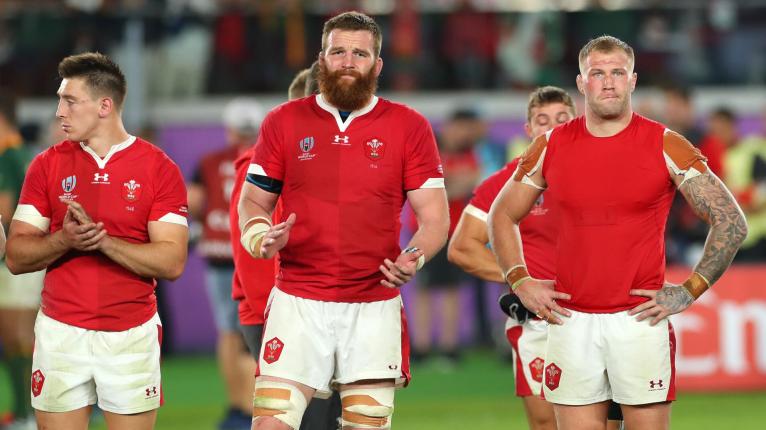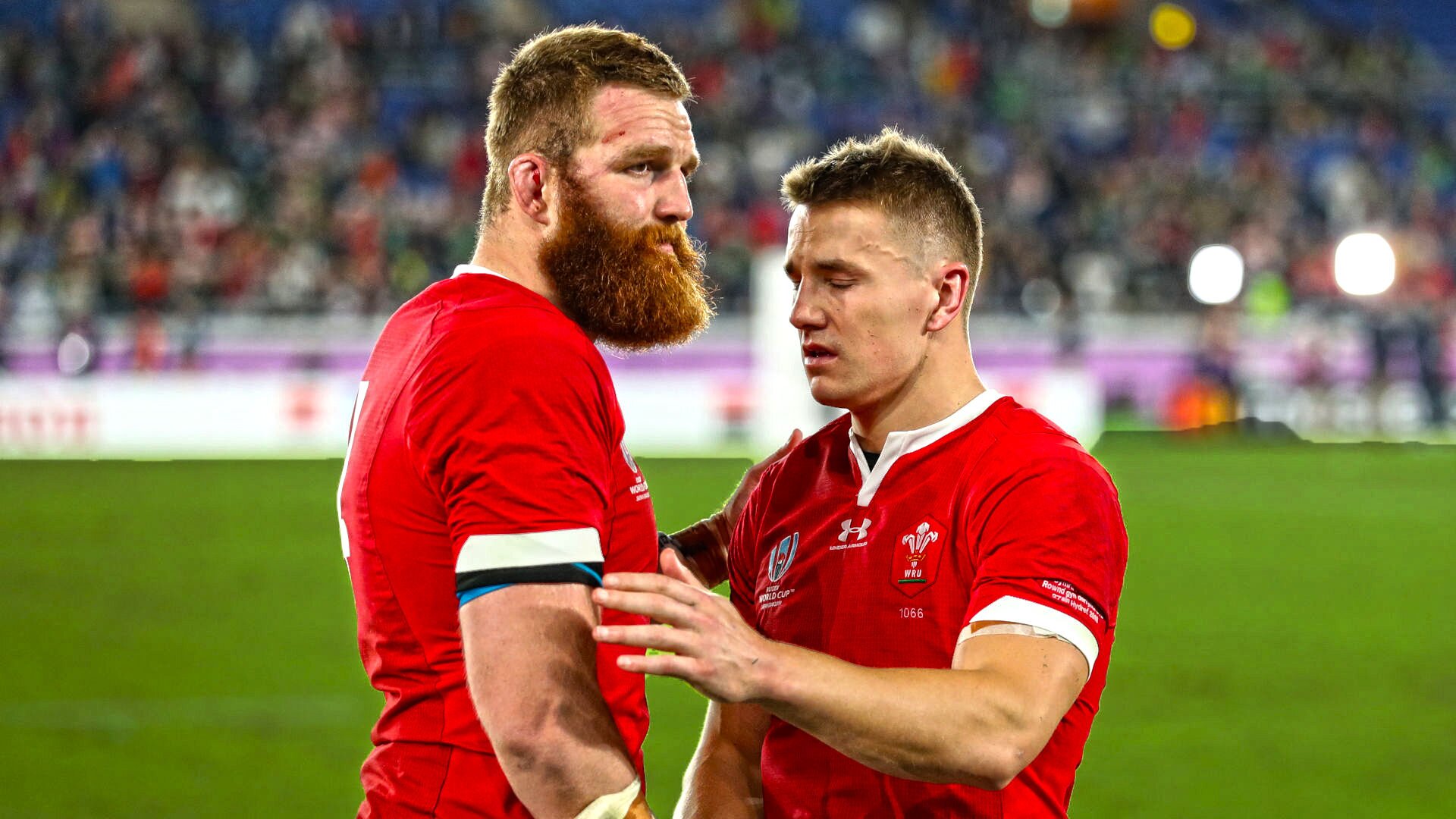There's been a long-held creativity void within the Welsh set-up

At the end, heartache. For what might have been.
At the final whistle, Welsh players stood tall, transfixed to the turf, looking for something to fixate their glassy eyes on. They were spent. Wales had exited the tournament at the hands of a nation for whom brawn is a badge of honour and intimidation a calling card yet they didn’t yield in any facet, not that courage offered them a slither of solace in those soul-searching moments.
The denouement to Warren Gatland’s 12-year fairy tale had, in reality, been taken away by one moment of opportunism. The intervention of a man revered by Sam Warburton as one of the world’s best snafflers, Francois Louw.
When the tireless Alun Wyn Jones carried into traffic, he was left isolated for half-a-second. Dillon Lewis couldn’t get to him and Louw pounced. Wales were penalised for holding on in an attacking position and a nation gulped.
Handre Pollard hoofed the ball 40 upfield, and just 73 seconds later, Jérôme Garcès raised his right-hand to award another penalty, this time after Rhys Carre had gone in at the side. With four kicks from four, Handre Pollard was in an unforgiving mood from the tee and bisected the uprights. That was that.
The game itself was a turgid affair, as games between these two sides often are. It was devoid of the free-flowing, careless abandon shown 24 hours earlier in the stirring England v New Zealand fixture. Granted, it was not fare that will garner a new legion of fans but if neutrals expecting an apology, they’ll be waiting a while. This was brutal, ugly knockout rugby and a place in the final was at stake. Rassie Erasmus and Warren Gatland admitted as much afterwards.
Fifty kicks in as many minutes told of a battle for the skies, as set-piece supremacy was sought in a sweaty mass of bodies at scrum-time and among giants at the lineout. It resembled a Keirin cycling duel as both parties kept each other at arm’s length, prodding and probing each other for what seemed like an interminable time, looking for mistakes. Ambition, derring-do? You had your fill yesterday, the sides seemed to suggest until Damien de Allende slalomed through a gaggle of flailing Welsh arms to power over on 57 minutes.
![Welsh]()
Shell shocked Wales players leave the field (Getty Images)
Finally, the game started to come to life.
As it moseyed into its final quarter, Wales’ ballsy call to shun a guaranteed three points was rewarded with a first-phase move from the back of a creaking scrum. Ross Moriarty peeled, popped the ball to Tomos Williams who fizzed the ball out to Jonathan Davies to execute a flat pass to Josh Adams to gallop over for his sixth World Cup try and leave the sides tied at 16 apiece after 65 minutes. Springbok nerves were jangling.
With ten minutes to go, Wales had some momentum, and with field position as they went for the jugular. A slightly premature swing of the right boot from Rhys Patchell with eight minutes to go went askew minutes before Wales lost possession but that was as close as they got. In truth, there was no sustained period where you felt Wales had a stranglehold on the game. At no point did they lead on the scoreboard.
It’s the game no one wants to play – and TVNZ will not screen the All Blacks’ playoff for the #RWC2019 bronze medal with Wales on Friday night.#RWCFinal #RWCBronze #AllBlacks #WALvNZL #NZLvWAL https://t.co/8oSKVbby0b
— RugbyPass (@RugbyPass) October 28, 2019
As the dust settles this week and raw emotion gives way to reflection, Wales will feel an emptiness that their World Cup quest ended not with humiliation by a far-superior side but by the finest of margins. South Africa’s tactics only reinforced what Warren Gatland had said on the eve of the semi-final, that his greatest legacy was that Wales were now respected on the international stage. They may not be well-loved for their less-than-sophisticated style but sides know no quarter will be given from minute one to 80.
Warren Gatland will be hoping to get the full set for Wales next week ??????? #RWC2019 pic.twitter.com/TFANf3F7OF
— RugbyPass (@RugbyPass) October 27, 2019
There is little doubt that injury played its part in their eventual downfall. By the time the final whistle was blown nine potential first team squad players weren’t on the field; Taulupe Faletau, Gareth Anscombe, Liam Williams, Josh Navidi, Cory Hill, Tomas Francis, Ellis Jenkins, Rhys Webb and George North. The Springboks were missing Chelsin Kolbe, Jesse Kriel, maybe Marcell Coetzee but Wales were undoubtedly flailing. Centre Owen Watkin was covering wing, Jonathan Davies was performing heroics on a heavily bandaged leg and Hadleigh Parkes was playing through the pain of a broken-bone in the hand and heavily bruised shoulder. That they got so close to a first-ever World Cup final is something of a miracle.
While Wales could boast a cap-laden first XV, the bench was wet behind the ears, averaging six starts per person, compared to 22 starts from the Springbok bench. It doesn’t take a nuclear physicist to work out that wouldn’t have been what Gatland was planning for in the months leading up to the tournament.
'We punch massively above our weight when you consider the playing size of numbers in Wales so I’m really proud of these guys'https://t.co/DiUGrqvBdP
— RugbyPass (@RugbyPass) October 27, 2019
If you’re looking for reasons to split hairs, there’s been a long-held creativity void within the Welsh set-up. For the avoidance of doubt, Wales are where they belong, in the top four in the World game. With the 11th biggest player base in world rugby, it’s irrefutable that they’re punching well above their weight, but to scale the pinnacle, and beat the world’s best two sides; New Zealand and England, they are playing catch-up in the try-scoring stakes. The challenge then for Wayne Pivac and Stephen Jones is to unearth some more potency with France 2023 now the long-term goal. This will not be easy. Wales has limited resources with the regions struggling for meaningful success, but necessity is the mother of all invention and the Welsh brains trust will have to be maximised.
The spine of the Welsh side is unlikely to head over the channel; Alun Wyn Jones, Leigh Halfpenny, Hadleigh Parkes, Ken Owens and Jonathan Davies are all unlikely tourists, but if you look at Wales’ 2019 squad, they have six players who are 23 or under so a next wave of players will be assimilated into the Welsh set-up when they’re ready. The likes of Tommy Reffell, Ioan Lloyd, Dewi Lake and Harri Morgan are likely to be in contention in the next couple of years. With the spectre of Shane Williams still to be filled, and the likes of sub-six footers Cheslin Kolbe, Jack Nowell, Sevu Reece, Santiago Cordero thriving, it suggests size needn’t be the only to bellwether for selection. Seeking space and not contact should still have its place.

For now, Wales have to harness the character they have shown in winning their last 24 Tests out of 28 to summon one last effort to stand up to a New Zealand side who will be doing their own navel-gazing after losing a first World Cup game since 2007. The All Blacks have potentially more searching questions to ponder such as whether their rarefied place in world rugby’s pecking order is under threat.
In what has felt like the long goodbye, Warren Gatland and Steve Hansen will both be leaving their respective positions as two of the most successful coaches in the modern era having coached over 200 Tests between them. Friday’s Bronze medal game is one which both would have preferred to avoid and when the game is decided, you can guarantee emotions will flow as freely as the beer.
The last 12 years has bought unprecedented success to Welsh rugby leaving his successor with an unenviable task but those are questions for the post-Gatland era. When the final whistle goes in Tokyo, a squad that has been brought so much pride to a nation will never be the same again.
Eddie Jones and Ben Youngs speak at a press conference following Saturdays win, seeing the England rugby squad seal their place in the final of the World Cup.


































































